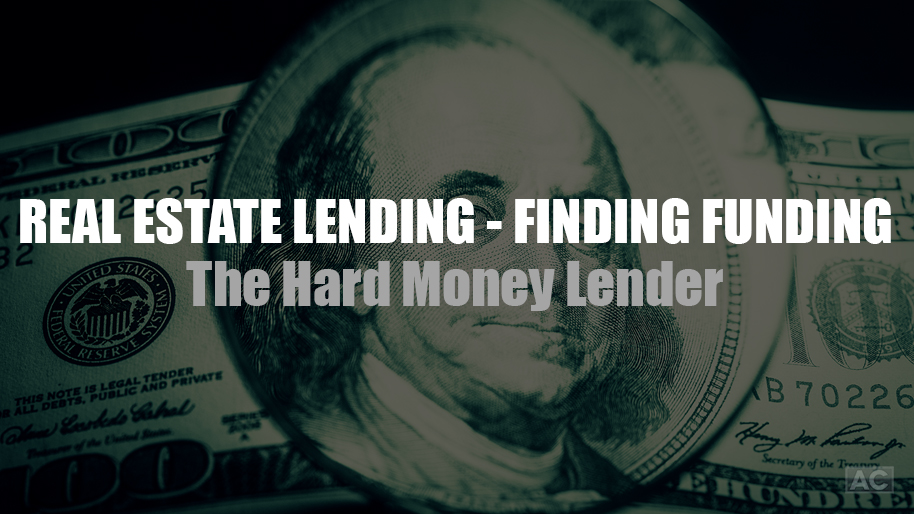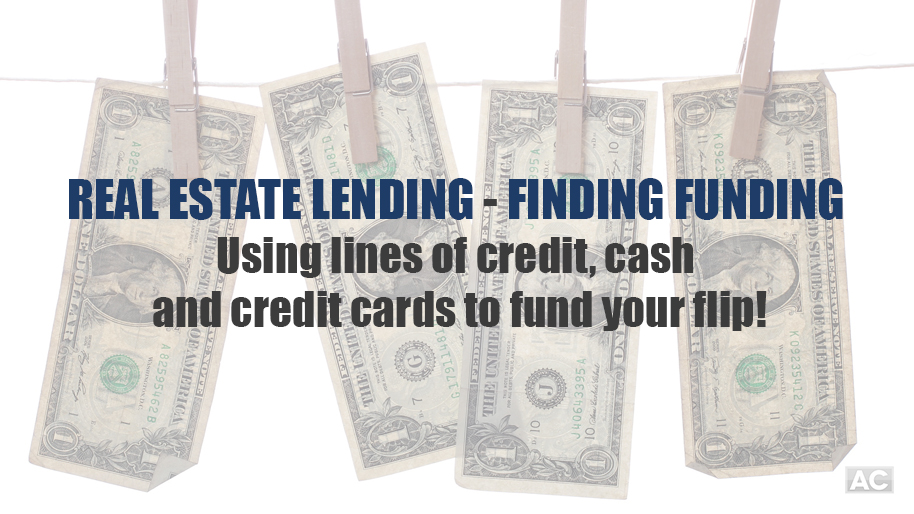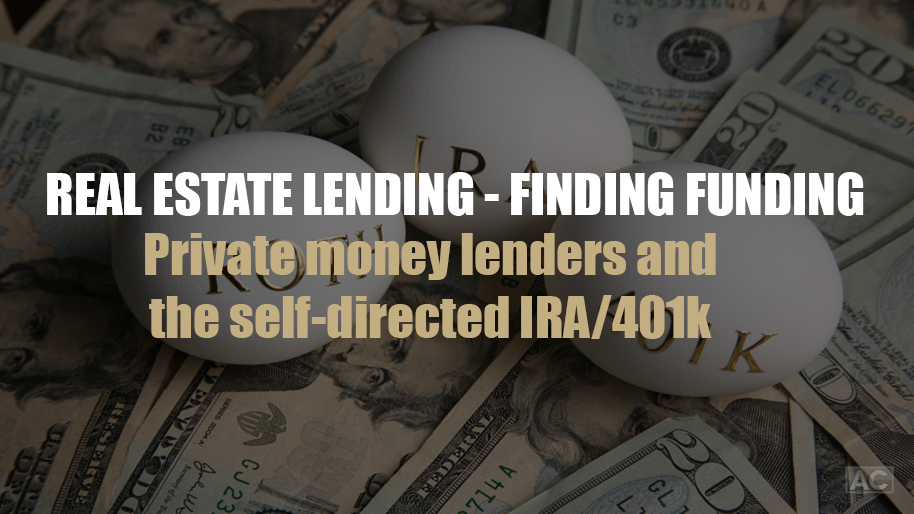
During the series introduction, I listed five funding sources for every investor. In the introduction, I merely skimmed over the five funding options. However, we’ll be discussing each funding option in more detail, beginning today with “HML” or Hard Money Lending. A hard money lender is a very easy route for investors. Why? Because HML’s are in the business to loan YOU money! It’s how they make money. As I mentioned previously, any investor worth his salt uses or at a minimum, has access to all five lending sources that I listed in the series introduction. In my opinion, HML’s are the easiest way to access funding. This is especially important for inexperienced investors. These beginner investors have a tendency to become obsessed with finding the cheapest “private” money, meanwhile, there’s an HML right up the road who is in-business to loan you money! Sure, maybe his terms are not exactly what you want but remember, don’t step over a dollar to save a dime! Hard money doesn’t necessarily have to be your only source for funding but it should take priority as the easiest way to get funding for your first flip. I just so happen to be in the middle of several large flips. I am currently closing on a home with a $500,000 purchase price. Yes, my other flips use other sources of funding, but for this one, I needed a hard money lender because of the price. I am in no-way a beginner investor as I’ve spent over a decade in the industry – but I still use hard money lenders for certain situations. Especially situations in which the purchase price is a little higher and I need guaranteed approval. How does a hard money loan work? An HML loans you funds to both purchase and rehab your investment. In most HML cases, one has to come to closing with roughly 10-20% down depending on the lender. HML’s will give you the option of a six or twelve month plan. I recommend a twelve month plan. Six months can work if everything goes perfectly. But if things don’t go as planned and the home doesn’t sell, the HML can foreclose or charge additional points or interest. HML’s make their money by charging you points/interest. One point equals 1% of the total loan. Interest will generally be anywhere between 12-18%. HML’s typically do not charge a pre-payment penalty so one can pay off the loan amount at any time without being charged additional monies. One will usually receive the rehabbing construction funds in several draws. These draws can be set-up in many different ways. For example, let’s say we have a $30,000 rehab project. In this case, one would typically set-up three separate $10,000 draws. You would then proceed to complete $10,000 worth of work and then...
Read More »

Last time, we discussed HML’s or “hard money lenders” and how they work. Today, I want to go over another source of lending. Lines of credit, business lines of credit, credit cards, and cash. This is borrowing money on a line of credit or on a low-interest credit card. Cash is obviously your best and safest funding option. The “rub?”. You have to have access to a large amount of cash! Most investors don’t have large quantities of liquid capital available, especially new investors. Cash is indeed “king” and if you have it, you’ll likely get a much better deal from your seller. However, in my experience, many of those who have the cash on-hand do not want to put it all out there on the line, they’d rather leverage it for multiple concurrent deals. Credit cards are often never even considered by investors. However, I know of several investors who have bought and rehabbed many investments using only a credit card. This is an especially good option when the credit card being used has super-low or no interest rates. I mean, that’s basically free money! Using a credit card is a funding option that many investors who have great credit miss out on. In fact, right now, one of my investor friends is doing a joint-venture (JV) deal with me and is using his credit card for the entire purchase. Quite literally, he has perfect credit and has 30-40 low or no-interest credit cards with very large limits. He built his credit up for years and once he decided to begin investing, his fiscal discipline paid off. Also, he literally can fund all of his own deals at almost no cost! Virtually everyone takes a credit card for payment these days. All it takes is an iPad and a square machine. Heck, with the right equipment, a vendor can slide it right through their smartphone on the spot! There’s also ways that you can get cash out of your credit card account. You can set-up whats called a Merchant Account which gives you the option to pull cash from their credit card and deposit it into their Merchant Account, which will then be paid out in cash. This links your credit card with you Merchant Bank account. Merchant Accounts are quite popular. Some examples are Amazon, Ebay, Paypal, etc. And for those who have some dings on their credit, there are companies out there that specialize in helping you build and repair your credit. Once they repair your credit, they will help point you in the right directions for lenders with better limits and interest rates. These entities will basically build or repair your credit. Now, let’s talk about LOC’s, or “Lines of Credit.” A line of credit is an amount of credit extended to a borrower by a bank or other financial...
Read More »

At this point in our “Finding Funding” journey, we have already briefly discussed the many different avenues of funding for real estate investors. We’ve discussed hard money lenders, lines of credit, credit cards, and cash. Today, I’d like to cover two more funding options: Private Money Lenders (PML) Self-Directed IRA/401k (SDIRA) PRIVATE MONEY LENDER: (PML) PML’s are the most lucrative avenues of funding that you can find. The next questions is, “why?” It’ simple – PML’s provide you the easiest and most profitable payment terms. However, they are typically difficult to locate and even if you do, you need a lot of experience under your belt just to reel one in. Every beginner investor that I know, including myself, make mistakes over the course of their first few flips. It is, in my opinion, the best way to learn – from our mistakes. One of the biggest mistakes that beginner investors make in their attempt to locate a good funding route is by spending far too much time attempting to locate a solid PML. However, in almost every single case, a PML is not going to loan capital to a new, untested, unproven real estate investor. And most PML’s that I know aren’t even lending all that much in real estate anyway. These are sometimes family friends, family members, doctor or attorney friends, or an affluent person in your direct circle of peers. But let’s just say you have contacted someone who is willing to loan private funds to real estate investor. However, he is concerned that you do not have any flips under your belt. Again, PML’s likely won’t loan to an investor who’s never completed a flip. You’ve got no experience yet you’re asking for a whole lot of money. But you don’t yet specialize in flipping and he doesn’t specialize in funding – this is a recipe for disaster! This is a good time to use another funding source (HML, LOC, CC, etc) and complete your first flip. You’ll get that PML once you’ve proved yourself. The advantages of a PML loan are awesome – No points Low interest: 10-12% No monthly payments until the deal closes I’ve seen situations in which private money lending has separated families and ruined relationships. Maybe your uncle wanted to help out and loaned you $100,000. But the flip turns sour, the house won’t sell, and you’re losing money. At this point, you’re uncle has to take over the project. This obviously causes immediate strife. Get some experience under your belt and then go after that PML with a proven portfolio. Don’t start out looking for private money. It’ll likely not pan out for you and will be a waste of your precious time. SELF-DIRECTED IRA/401K: (SDIRA) There is more money available here for rehabbers than anywhere else you can go. There’s...
Read More »

We’re on the back-end of our “Finding Funding” series and today I’m going to discuss my personal favorite avenue of funding. The Joint Venture Agreement, referred to in this article as a “JVA.” I use JVA agreements on the majority of my flips. It’s my favorite avenue of funding for my “buy, fix, sell” properties. This is because it means that there’s literally ZERO monies coming out of MY pocket. You might be wondering how that’s possible? I structure my JVA’s so that the lender pays 100% of out-of-pocket costs. He pays the earnest money, the purchase, the closing costs, insurance, utilities, all construction rehab costs…everything! I prefer doing JVA’s as it provides me the ability to do multiple concurrent deals at the same time without a lot of outgoing funds. For instance, I can do five JVA’s at the same time and not have it affect my pocketbook. There is literally zero out of pocket expenses. But if I were to do five HML (hard-money lender) deals at the same time, I would require a huge amount of upfront capital! I’d have to put up 20% for each house as a down payment on the loan. In addition, I’d have to pay all earnest monies, closing costs, insurance, utilities, the monthly payment, and don’t forget that I’d have to also front all of the construction funds! This would equate to hundreds of thousands of dollars, if not more. Obviously, with JVA’s, one can grow at a rapid pace without incurring all of the risk. It’s win-win! How does one structure a JVA? Well, there’s two ways to do this but In both scenarios, there is a JVA agreement in place: The JVA lender holds the title to the property – and I’m ok with this as long as we have a JVA in place. The JVA contract is between the lender and me and dictates that upon sale, all previous expenses are reimbursed and the remaining profits are divided per a previously agreed-upon split. The most common split is 50/50, but I have worked with JVA lenders who give me a 70/30 split! But I’ve never agreed to pay more than 50% of the profit to the lender. I (the investor) hold the title and the JVA lender takes first lien with the mortgage and note. At closing, an attorney or title company will record a mortgage and note for the property so that when the property is sold and before any monies are taken out, the mortgage gets paid off first. JVA lenders prefer experience so you should gain some before you attempt a JVA. It’s not likely for someone to loan you money without a proven and successful track record. The JVA lender absorbs the majority of the risk during a JVA flip. It’s a high risk yet high...
Read More »
Page 2 of 64«12345...»Last »











